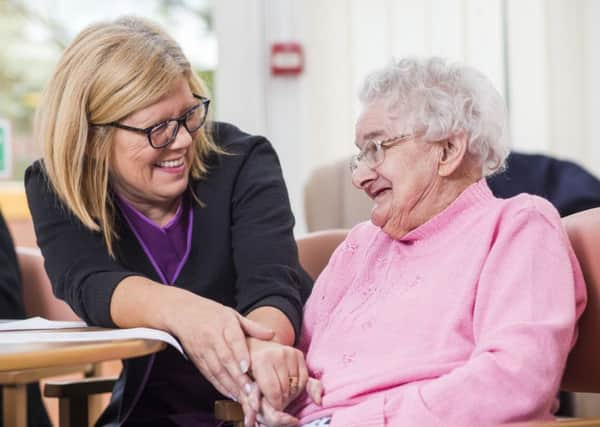Caroline Dinenage: Help us meet care challenges of ageing


This great news is nevertheless having a profound impact on us as individuals, collectively, and inevitably on our health and social care system. As a society, we need to think not just about ageing, but ageing well and how we can live independently for longer.
Across Government we are already working on the Ageing Society Grand Challenge to ensure Britain remains at the forefront of the technological revolution around ageing. This is supported by a £98 million ‘healthy ageing programme’ which will drive the development of new products and services to help people to live in their homes for longer, tackle loneliness, and increase independence and wellbeing.
Advertisement
Hide AdAdvertisement
Hide AdHowever, a sustainable health and care system is central in supporting independence and wellbeing in older age. Social care encompasses a range of different types of support that enable people to live comfortably, from a carer coming to visit you at home to help with your medicine or washing and dressing, to 24-hour care in a residential home.
It is quite rightly a priority concern for millions of the most vulnerable people in society who rely on it to go about their everyday lives. 2018 has already shown itself to be a decisive year for the sector with the introduction of my role as a dedicated Minister of State for Care, alongside the creation of the renamed Department of Health and Social Care.
This reflects a recognition within central Government of how important it is to find an effective, long-term solution for social care. An upcoming green paper, a government consultation on what we can do to improve the system, will set out reforms so that people of all ages – including some of the most vulnerable in society – can be confident in the system, knowing that their care needs will be met now and in the future. The reforms seek to address the main challenges facing the sector: the quality of the care people receive, how best to integrate with the health service, giving people more control over their own care, making sure we have a workforce with the right skills and equipment, supporting families and carers, and ensuring the system is there for everyone who needs it in the future.
When it comes to quality, 82 per cent of care homes and home care providers are now rated good or outstanding by the Care Quality Commission – testament to the hundreds of thousands of hardworking and committed professionals working in care. But still too many people experience care that is not the quality we would all want for our own mum or dad, and there is too much variation between different services and different parts of the country.
Advertisement
Hide AdAdvertisement
Hide AdCloser working between health and care will help address some of these problems, and there are already good examples of this happening throughout the country. For example, in Leeds an integrated care record is now used by over 5,000 health and social care professionals so hospitals arrange faster discharges with care packages put in place more quickly. We need to do more to ensure people up and down the country receive great care like this, returning home as soon as they are well enough, with the care they need to support them in the community. One of the priorities of new Secretary of State Matt Hancock is prevention –empowering people to remain healthy in their homes for longer, treating problems quickly and delivering care in the appropriate settings.
This will be complemented by the recently announced NHS 10-year long-term plan. Health and social care are two sides of the same coin and any reforms must be aligned. Building a sustainable care and support system will require some big decisions. The prize is a better system that everyone can have confidence in, where people understand their responsibilities, can prepare for the future, and know that the care they receive will be to a high standard. We want to help everyone maintain their independence and well-being throughout their lives.
I am keen to hear a wide range of views from the social care workforce in Yorkshire, those receiving care and those who support their loved ones day in and day out.
Ensuring a long-term, sustainable approach to social care is too important a task to complete in isolation and we must get it absolutely right.
Caroline Dinenage, Minister for Care